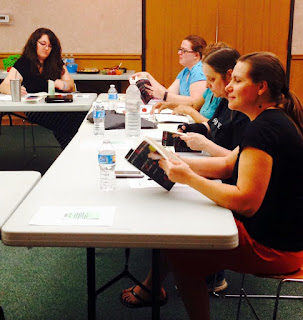To briefly summarize the story: a female journalist interviews a famous and beloved poet, attacking the image he has cultivated for himself, revealing the far more awful man below the surface. What makes this a particularly controversial story is that the poet is Robert Frost, a real poet who is both famous and beloved.
More than one voice in the discussion group brought up an interesting question, "Why couldn't this story have used a fictional poet instead of Robert Frost?" The interviewer, Evangeline Fife, is a fictional character, so despite Oates' claim to base the story on real sources, it is an entirely fictional one. Frost never had this confrontation. So why not just create a fictional poet instead?
There was an interesting response to that argument. One woman at the discussion thought that because he wasn't a fictional character people had stronger reactions. Without Robert Frost, it's just two pretend people having a conversation. None of our preconceived notions about Frost align with the image created by Oates. Perhaps, Oates was shattering an idol.

This lead to many other issues. For example, the lack of sources sited by Oates. If Frost had been an actual good person, did Oates have the right to demonize him? And if Frost was not who we all thought he was then what should we think of his works?
There were two sides to this argument. The first side thought that we could look past a flawed man to embrace his works. One person asked, "Does the character of Bukowski or Pound ruin their works?" A fair question. Without a doubt, these were great writers. On the other side of the argument was a much more contemporary figure: Bill Cosby. It would be hard to appreciate The Cosby Show knowing what we know about Bill Cosby now. In that situation, the legacy of the man seems to have ruined the works.
I'm not sure there are any correct answers here. Sometimes great works transcend the people who write them. Sometimes great works are destroyed by them. There was no universal consensus on Frost or Oates, and most everyone had very mixed feelings on the story, but we all walked away with a greater perspective.

This lead to many other issues. For example, the lack of sources sited by Oates. If Frost had been an actual good person, did Oates have the right to demonize him? And if Frost was not who we all thought he was then what should we think of his works?
There were two sides to this argument. The first side thought that we could look past a flawed man to embrace his works. One person asked, "Does the character of Bukowski or Pound ruin their works?" A fair question. Without a doubt, these were great writers. On the other side of the argument was a much more contemporary figure: Bill Cosby. It would be hard to appreciate The Cosby Show knowing what we know about Bill Cosby now. In that situation, the legacy of the man seems to have ruined the works.
I'm not sure there are any correct answers here. Sometimes great works transcend the people who write them. Sometimes great works are destroyed by them. There was no universal consensus on Frost or Oates, and most everyone had very mixed feelings on the story, but we all walked away with a greater perspective.













